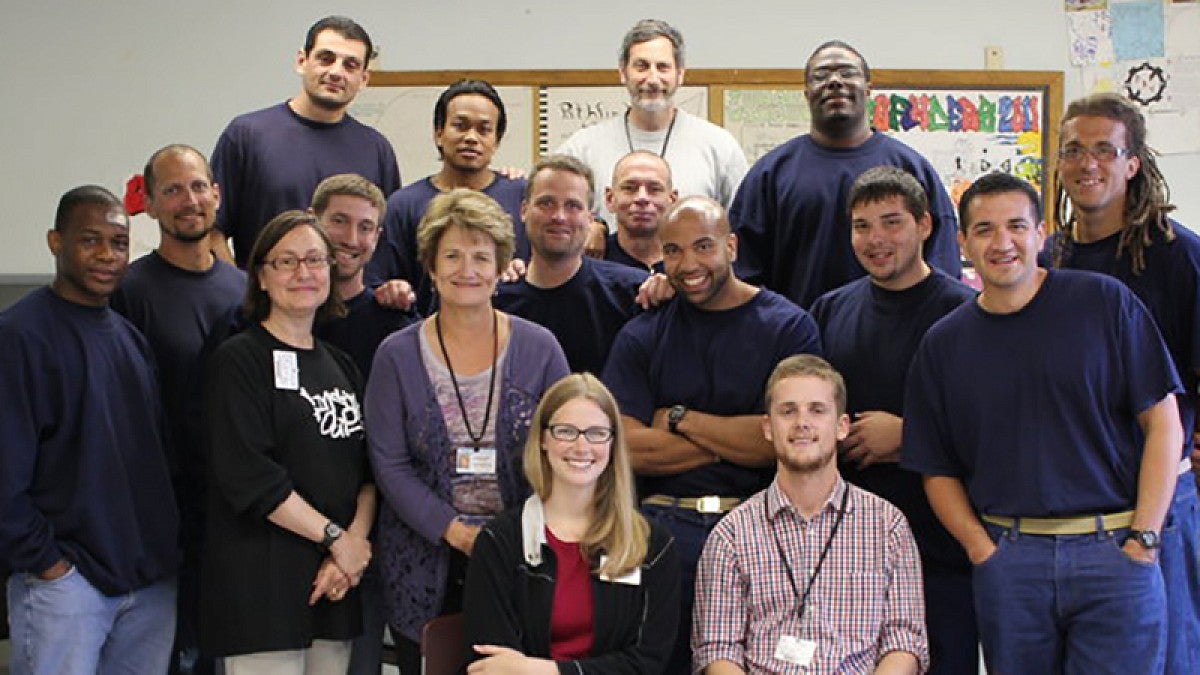A University of Oregon program that provides educational opportunities to incarcerated Oregonians is expanding with a boost from The Andrew W. Mellon Foundation.
The UO’s Prison Education Program received a $481,000 grant from the Mellon Foundation to increase its educational programming in prisons around the state. The award will build on the work the Prison Education Program has done since 2007 to serve incarcerated Oregonians and to offer UO students an opportunity to take classes in a range of subjects and to learn with and from their incarcerated classmates.
“A single day of education or a single course can be a transformative experience for an incarcerated student,” said Shaul Cohen, a geography professor and director of the Prison Education Program. “This funding will enable us to increase access to these opportunities and work toward our goal of making education available to as many people in prison as possible.”
The award will fund three separate initiatives that will help increase access to higher education courses, lectures and materials in facilities across Oregon. One of the benefits of correctional education is that it has been shown to help people find employment and avoid returning to prison, according to data from the nonpartisan Rand Corporation.
The Prison Education Program will be able to train additional faculty members from the humanities to offer their classes in prisons, which will position the program to offer more courses and a greater depth of subject matter inside prison walls. The funding could allow the program to double the number of faculty members teaching the classes. Some of the current and past course offerings have included Water, Climate, and Environmental Justice and War and Peace and Totality and Infinity: Tolstoy & Levinas.
“These classes allow both UO students and incarcerated Oregonians to learn with and from each other,” said Katie Dwyer, who participated in the program as an undergraduate student and is now the coordinator of the Prison Education Program and a UO communications instructor. “We hear so many stories about how this programming changes people’s trajectories and influences their lives.”
“At no time in my life previously had I encountered such an intense concentration of compassion and empathy in a gathering of people. Nothing could be of greater value,” said Bobby, an inside student participant.
The funding will also allow the Prison Education Program to broadcast more University of Oregon programming on televisions throughout all 14 prisons in Oregon.
The Prison Education Program partners with campus groups like the Oregon Humanities Center, the Wayne Morse Center for Law and Politics and the Jordan Schnitzer Museum of Art to give incarcerated Oregonians access to community programs that are recorded on campus. The award will also allow the program to hire someone to manage Prison Education Program TV: a former inside student who earned a bachelor’s degree through the UO while incarcerated.
The third component of the Mellon award is a pilot program that will offer educational materials to incarcerated individuals in isolated settings within the prisons, including solitary confinement and mental health units. The program developed out of a request from students inside the prisons.
It will provide reading materials to individuals in isolation units as well as give feedback on their writing in response. The hope is the offerings could be a gateway for other academic opportunities and credit-based courses for such individuals.
Cohen believes the UO will be one of few, if not the only, school offering that kind of programming in the nation. He hopes the UO can develop a model for other institutions looking to expand access to educational materials to more isolated incarcerated individuals.
The Prison Education Program developed out of the UO’s Inside-Out Program, which was started in 2007 to offer credit courses that included a mix of UO students and incarcerated students. Hundreds of UO students and more than 1,000 incarcerated students have gone through the program since its inception, and the UO program grew to be one of the largest in the nation.
It has now grown into a broader program that also offers not-for-credit courses, pathways to degrees, and other noncredit opportunities like faculty lectures, UO student club programs and book discussions.
“We are delighted the Mellon Foundation recognizes the many benefits of these educational opportunities for incarcerated students and wants to invest in the Prison Education Program to help it grow,” Cohen said. “We see our work as deeply intertwined with a core mission of the University of Oregon: to enhance the social, cultural, physical and economic well-being of our students, Oregon, the nation and the world.”
—By Emily Halnon, University Communications


